Jul 25
Massively tragic overpopulation will not redeem, liberate or dignify anyone. Rather, it will imprison the human spirit, heighten economic inequality and kindle unending strife and despair.
William Hollingsworth, Ending the Explosion 1996
This book dares to go beyond the conventional wisdom. It comes to grips with the need for solutions that are both adequate and humane. In doing that, and in doing it so well, this book meets a dire need in the population policy discussion. Professor Hollingsworth shows in poignantly human terms why humanity must promptly redirect its reckless demographic course.
Donald Mann, President, Negative Population Growth, Inc.
Afterword: A Comparison
- The population of the United States today is 309 million people
- In 1996 we had a population of 265 million people
- That is a 14% increase in about 14 years or 44 million people
- Some perspective: that is another state of California plus 7 million people
Today, we surely are more and more imprisoning the human spirit, heightening economic inequality and kindling unending strife and despair.
Two Questions
- Consider what it is going to be like with at least 353 million people in 2024
- Would this country not be far better off today with 44 million fewer people
Society Statistics
Jul 23
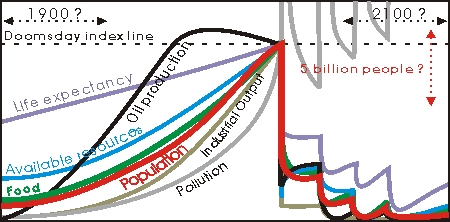
A Perfect Catastrophe
The graphic was created by me in an effort to try and project a reasonable growth pattern for these various important factors impacting humanity. The dates are not exact because the effects are not exact but over the course of a hundred years they will probably look reasonable. More reasonable than other projections I have seen because no one seems to fess up the the likelihood of a major war and what that will look like when graphed.
PROBAWAY-LIFE HACKS
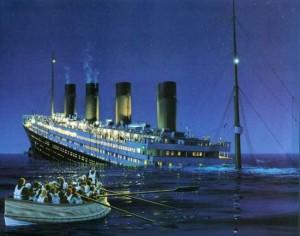
In the early years of the 21st century, the United States continues on a course toward adding another 100 million people by 2035. (Source: “US Population Projections” by Fogel/Martin, PEW Report, U.S. Census Bureau) Beyond that, population projections show America doubling its current populace to 600 million in the latter half of this century. At the same time, the world demographic figures show an added three billion humans to planet Earth by 2050.
With accelerating ‘symptoms’ exploding across America and the world via water and food shortages, species extinction rates, energy crises, climate destabilization, ocean dead zones and more ramifications on multiple levels—we find ourselves passengers within a civilization that parallels the metaphor of the Titanic. If you remember, on April 14, 1912, the RMS Titanic, the finest steamship of its era, on its maiden voyage, sped too fast and arrogantly through iceberg infested waters of the North Atlantic. It hit one and sank—to become one of the greatest tragedies that didn’t have to happen in the 20th century.
Our own grave overpopulation crisis need not manifest within the United States, either, if we change course. Like Captain Edward John Smith of the Titanic, he could have slowed down or steamed further south to avoid his fate.
The United States could also change course and avoid adding 100 million people within the next 25 years. However, no American leaders step up to the microphone with any concern. The passengers of our American civilization continue ‘trusting’ their leaders similarly to the passengers on the Titanic. “Captain Smith knows what he is doing,” they said. “Our U.S. Congress and president must know what they are doing,” citizens lament.
But like Titanic’s Captain Smith, the U.S. Congress and president of the United States—don’t know what they are doing.
Frosty Wooldridge
We put that question ( Why Is Population Control Such a Radioactive Topic? ) to several experts from diverse perspectives, including a feminist, a science writer, an obstetrician, a racial justice advocate, and the author of The Population Bomb.
They checked in on this Mother Jones forum May 12-14 to discuss their controversial answers with readers—and each other. Want to hear more from Paul Ehrlich, Fred Pearce, Julia Whitty, and the rest of our panel about their take on population control? Now’s your chance.
Mother Jones
Guest Author The Titanic
Jul 18
At first look it would seem there could be no more two incongruous films than Battlestar Galactica and Groundhog Day!
One, A Melodramatic Look Into the Future and Past
A lost, nuked human race, pursued by their own man-made attackers rockets away from the vestiges of their doomed planet, all the while searching endlessly for a new home in the not too friendly outreaches of intergalactic space.
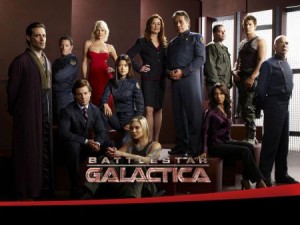
The Cylon War is long over, yet we must not forget the reasons why so many sacrificed so much in the cause of freedom. The cost of wearing the uniform can be high, but… sometimes it’s too high. You know, when we fought the Cylons, we did it to save ourselves from extinction. But we never answered the question “Why?” Why are we as a people worth saving? We still commit murder because of greed and spite, jealousy, and we still visit all of our sins upon our children. We refuse to accept the responsibility for anything that we’ve done, like we did with the Cylons. We decided to play God, create life. And when that life turned against us, we comforted ourselves in the knowledge that it really wasn’t our fault, not really. You cannot play God then wash your hands of the things that you’ve created. Sooner or later, the day comes when you can’t hide from the things that you’ve done anymore.
Commander William Adama Battlestar Galactica
The Other, A Comedy of Sorts
A silly Pennsylvania tradition is frozen in time while a weatherman plays out his existence, returning to the same day after day monotony, until he recognizes, understands and transforms his many character flaws, and his life no longer remains on hold.
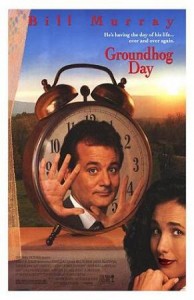
Phil: What if there were no tomorrow?
Gus: No tomorrow? That would mean there would be no consequences, there would be no hangovers. We could do whatever we wanted!
Phil: [thinking] That’s true. We could do…whatever we wanted.
Phil: Well, what if there is no tomorrow? There wasn’t one today.
Groundhog Day
Lessons and Consequences of Choices
Today, the films combine to reveal abject lessons as our planet struggles badly with its own future:
- We are constantly driven by huge ever increasing populations
- Completely dependent on technology for our survival
- The unmitigated failure to learn from the mistakes of the past
- Blinded by the misery that surrounds us
- Too trapped by fear and the unkown to change our ways
- And the chances for survival precariously slip away as each day passes
There is a ruthless naivete and irony by the remaining fifty thousand survivors of the Galactic ship’s crew and supporting flotilla:
- They curse and blame the dogged enemy
- They justify and defend themselves against the onslaught of Cylon robots and human hybrids
- Those Cylons were created to ply the work that the human race decided was either beneath or beyond them
Like the computer HAL in 2001-A Space Odyssey, which was designed to support wider human exploration, and then transcends that purpose to control and dictate to its creators much more than was ever imagined.
Once we finally give our destiny and our very existence to technology alone, the soul and spirit of mankind dwindles into a meaningless darkness, the same darkness from which we have most likely emerged so many times before, either here on this planet or other places in the universe.
Redux Again
Whether one fictional character is entrenched in a 24 hour cycle or it is a race of humans mucking away in another one million year cycle, it is the same mendacity and sense of superiority that prevails and guarantees our downfall.
So there is a collision of minds between Battlestar and Groundhog. Together, in a most unlikely tandem, they warn us again that as our numbers increase and we are compelled to turn to technology for our very survival, we must also face the consequences of that pact.
Therefore, when the machines of technology once again destroy, replace or drive us from this venerable and endangered environment, and those who survive begin their quest for yet another sanctuary, there is nothing left to blame but ourselves.
Society, Technology Battlestar Galactica, Groundhog Day
Jul 06
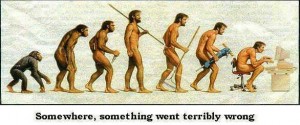
Ours is a world of nuclear giants and ethical infants. If we continue to develop our technology without wisdom or prudence, our servant may prove to be our executioner.
General Omar Nelson Bradley
The Struggle of Biological Man and Technological Man
Biological mankind, in a relatively stable environment for over a million years, is finding the contemporary pace of emerging technologies a test for everything that we have known before.
- All of mankind’s biological history has little to do with present digital information based lifestyles
- Fifty years is a genetic and instinctual minute compared to the previous million years
- It will be many centuries before our primordial nature fully adapts to the realities of ever-changing technology economies
So we are not simply 21st century beings, but a complex compilation of thousands of centuries, blended into behaviors we all exhibit today.
Consequently, the pace of our technology transformation is out of sync with mankind’s traditional capabilities.
The Results of Consumer Technology and Expanding Populations
- Violence: A national symbol of American culture
- Crime Rates: An urban nightmare
- Prisons: If not for cost we couldn’t build them fast enough
- Mental Hospitals: Crowded warehouses for discarded lives
- Fear-Anger-Neurosis-Anxiety-Depression-Virtual Reality: You name it, we got it
- Detached-Solitary-Impersonal Lives: Hiding behind Televisions, Computers, Smart Phones
- Children Having Children: The only thing they know
We are out of balance, out of touch with the classical relationship we have had with our environment, and therefore, with each other.
We know technology can have many benefits, but there is a growing awareness that the benefits, if left unchecked, may control our lives in ways we are not fully able to comprehend yet.
The Old Triangle
Life forms on earth emerged because three separate elements of the environment (air, land, and water) produced conditions which were necessary for sustaining and developing new life systems.
Man is a product of adapting to the natural world, which shaped both his physical characteristics and his emotional and intellectual development.
For eons, an ancient triangle existed which represented man’s dependent relationship on the three basic elements. It was man’s precarious link to existence, a link which controlled his life and dictated his daily routine.
The New Triangle
The points on the old triangle, are being involuntarily reshuffled into one unified point. The other two points have now been replaced by powerful forces which are incrementally changing traditional biological relationships of the distant past.
- The Environment
- Mankind
- Technology
The environment then is no longer the singular engine of this planet, but part of a troika pulling the train of life.
It is a serpentine trail wandering through time in a perpetual state of change, unsure of its destination, but moving steadily away from the roots of mankind’s existence.
Some believe technology is the new savior, a priceless discovery to be nurtured and developed until it finally reveals all its great secrets, and we will finally be free from the environment’s primordial, dependent relationship.
Technology is predicted to be the great liberator of human toil and misery, a super-renaissance in the ongoing development of our existence on this planet and beyond.
Remembering the Past: Fight or Flee Instincts
From past history, combined with the lessons of more recent events, it is questionable whether mankind is prepared for the journey.
If we are both lucky and smart we will continue our march through time.
Surely we can alter and control the acceleration and ultimate velocity of our travels, and it may be prudent and timely to do so.
Without fully considering all the possible ramifications, the journey for many in the past has been and could be for most of us in the future one of ongoing terror and violent conflicts.
We still remain more biologically suited to searching for food with fight or flee instincts, rather than pondering and adapting to technological and population forces racing to new levels beyond our wildest dreams.
Image Credit: Technology and Evolution www.encefalus.com
Society, Technology Triangle of Life





